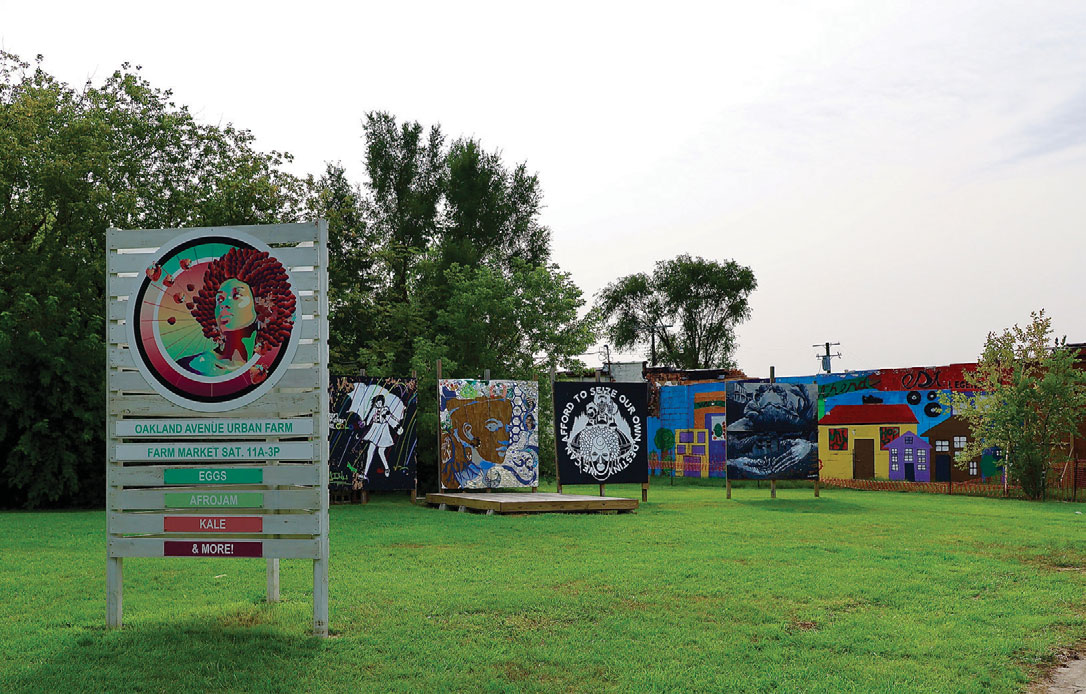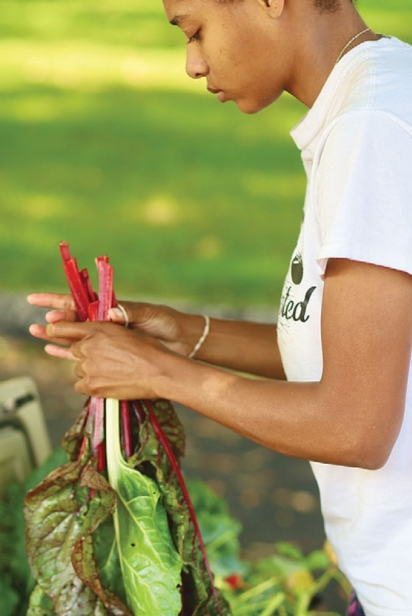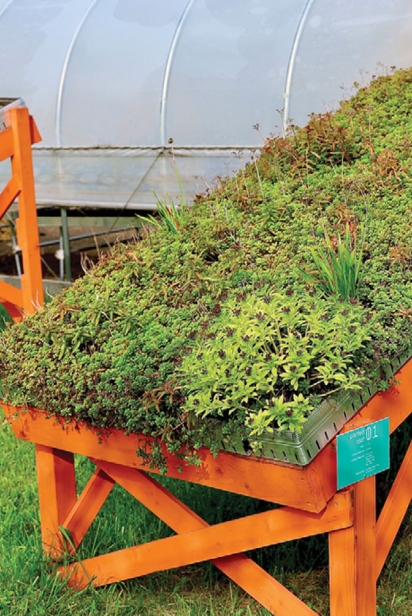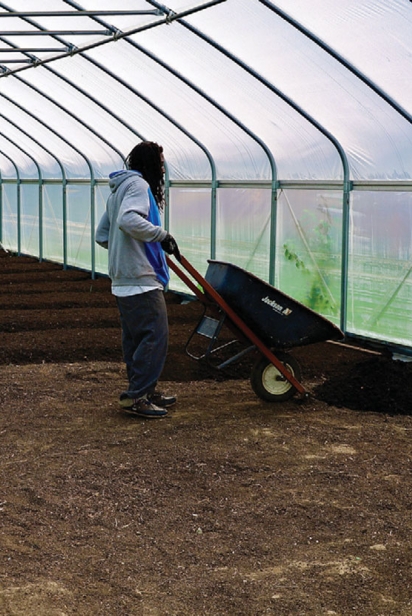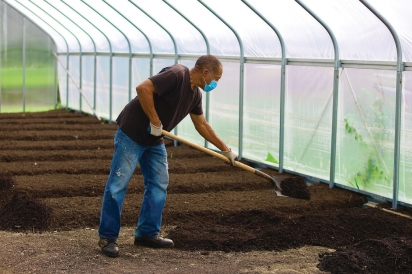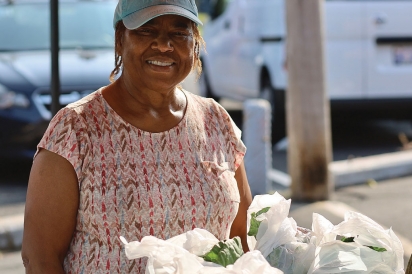Putting Down Roots
Here’s how Detroit farming advocates are helping black farmers take ownership of their land
It took 15 years for the founders of Oakland Avenue Urban Farm to officially own the land it had cultivated for years in Detroit’s Northend.
Jerry Hebron left her job in real estate and moved back to the neighborhood where she grew up in 2008. At the request of her mother, Rev. Bertha Carter, pastor of the St. John Evangelistic Temple of Truth church, she took the helm of the Northend Christian CDC. Hebron was tasked with finding out the neighborhood’s needs. What she heard was there was a need for jobs, food and housing.
Hebron then learned about Greening of Detroit’s work in the neighborhood and she reached out for help. That led to the first garden on one of the church’s vacant lots adjacent to the church.
Prior to the planting of that first garden in 2009, the church had a purchase agreement with the City of Detroit since 2000, Hebron says. All they were waiting was for a closing date. And indeed they played the waiting game for 15 years, dealing with years of transitions at the City and being told that there was a better use for the land than farming.
Hebron continued to nurture relationships with the City because she figured collaboration would be more effective than fighting. In the meantime, they continued to farm on the land, make capital improvements and create a community space. Today Oakland Avenue Urban Farm spans six acres.
In 2015, Hebron got a call from got a call from her connection at the City who asked her “Can you be down here tomorrow at 3 o’clock? I can close this.” And finally, after 15 years, the original purchase agreement for $2,100 to buy 10 lots on Oakland Avenue was a done deal.
“It was a very difficult situation. We were running the risk of being displaced. It was a possibility. But we were determined to display that agriculture can be a beautiful part of a community. It could build relationships, and it can create a space for people within that community to feel welcome and create a safe place of belonging,” she says.
For many Black farmers, not just in Detroit but nationwide, there are a lot of challenges and barriers to acquiring land, a result of systemic inequality. Nationwide, Black farmers own very little land. According to the 2017 Census of Agriculture, there were nearly 49,000 Black producers, or 1.4% of the country’s 3.4 million producers. The number of Black -operated farms declined 3% between 2012 and 2017.
In Detroit, “there have been some gardeners displaced by development,” says Tepfirah Rushdan, co-director of Keep Growing Detroit, a nonprofit that supports gardeners and urban farmers across the city. While the organization doesn’t have exact figures on Black-led farms and gardens in Detroit, in general the number of farms and gardens KGD has helped support has increased over the years. In 2003, there were 70 farms and gardens. This year, there were 1,900 gardens, up from 1,600 last year. Rushdan says the pandemic has spurred the interest and growth of farms and gardens in the city with a lot of people being at home and the issue of food insecurity.
In her role, she helps people with land acquisition. “We’ve anecdotally noticed, not necessarily taking metrics, but we’ve noticed that more white farmers get through the approval process [more easily than Black farmers],” she says. Other barriers include navigating a complicated landscape to purchase land from the City and having to retain a lawyer, but it all comes to lack of capital.
In recent years, Rushdan says the City has made strides to address the challenges Black farmers face and to help streamline the process of acquiring land, including the new Vacant Land Reuse Policy through which Detroiters can purchase a neighborhood lot for $250, among other types of lot types. Prior to the new policy, the Side Lot program was the only vacant land sales program designed specifically for Detroiters. To acquire a side lot, the buyer’s property must be adjacent to the land. If a buyer didn’t qualify to buy a side lot, the only option was to purchase the lot at market rate through a shared application process with the City, says Alyssa Strickland, assistant director of public relations and strategic initiatives, at the Detroit Land Bank.
“This process is cumbersome, and prices are determined by market value. Now with our new programs, there are more lots for sale through dedicated pipelines, more ways to qualify, and at affordable prices for Detroiters.”
Under the Vacant Land Reuse Policy, other land types for sale include oversized lots, accessory structure lots, homestead lots, and infill housing lots, Strickland says, and the DLBA expects the most popular to be the neighborhood lot program.
The new rules are significant “because Detroit has such a large amount of publicly owned land”, Strickland says. “The DLBA’s inventory is the largest of any land bank nationwide. Our mission is to return blighted and vacant property to productive use. That means our goal is to get as much of our inventory back into private ownership as possible and our programs are designed to do that in a way that directly benefits Detroit residents.”
While the City doesn’t have specific numbers, Strickland says most buyers use side lots to expand their yards and others use them for community spaces, gardens, and urban farming.
“We expect many Neighborhood Lots will be used to beautify blocks and provide green space and gardening opportunities,” she says.
In conjunction with Oakland Avenue Urban Farm and Detroit Community Food Security Network, Keep Growing Detroit launched the Detroit Black Farmers Land Fund crowdfunding campaign, a community-based effort to help “rebuild intergenerational farmland ownership for Black farmers in the City of Detroit.”
Rushdan says they set a goal of $5,000 to help a couple of farmers in the spirit of the “good old fashioned fish fry.” By the end of the day, they had surpassed $5,000 and kept on going.
“We were in complete shock,” she says. They ended up raising more than $50,000 and received 60 proposals from Black farmers in Detroit looking for support.
That response underscored and highlighted a couple of common threads, including people’s desire to provide fresh food for their families and communities, and that the number of applicants shows how many people don’t have ownership of the land they’re farming on, Rushdan says.
The plan was to announce the winners at the annual DTown Farms gathering, which was postponed to later in the fall. Rushdan says for the latest updates go to Keep Growing Detroit’s website at detroitagriculture.net.
One of the applicants was Erin Cole of Nurturing Our Seeds on the East Side, and according to their proposal to the DBFLF, they’ve estimated it will take $4,000 to acquire the eight lots that used to be owned by the family from the City. In 2010, Cole and her husband, Magnetic Sun, started a flower garden on the East Side, in a lot across from Sun’s great aunt’s home. The lot was overgrown with weeds “taller than a six-foot man” and they had to keep coming over to cut the grass. Then they planted flowers and some of the crops Sun’s great-aunt loved, like mustard greens.
“We planted a little bit and then a little bit turned into a lot and then a lot turned into a lot more,” says Cole, who is also a teacher in the River Rouge school district. “And I tell people all the time we just kind of did a thing. We just saw a need, a problem, and we wanted to provide a solution specifically for our great-aunt. And then we stopped and saw another problem and we want to provide a solution for that. And so out of that, we started this growing organization to take over the narrative of what this block looks like.”
On their farm, they grow over 30 different fruits, vegetables and herbs. Through Nurturing Our Seeds, they want to make the community healthier by increasing access to healthy food through its CSA program. Part of their mission is to hire people from the area to teach them how to reconnect with the land and work with their hands. Whether it’s fostering people or growing food, it’s all based on their community-oriented model, Cole says.
Community gardens and urban farms are more than just food, Rushdan says, adding the farmers are spending money out of pocket to beautify the property that has fallen into disrepair after years of disinvestment.
“It’s about neighborhood investment. It’s about beautification to a neighborhood,” she says,
For Cole, Nurturing Our Seeds aims to be foundationally rooted in community building and group economics, but more importantly cement a legacy for the next generation.
“Once we acquire the land, this time it will not be lost,” Cole says.
Oakland Avenue Urban Farm is located at 9227 Goodwin St. in Detroit. Nurturing Our Seeds is located at 7733 Helen St. in Detroit.


